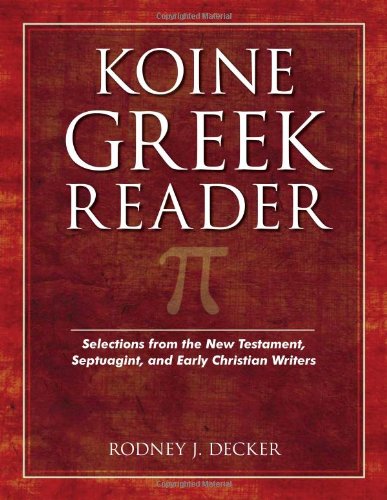 Koine Greek Reader: Selections from the New Testament, Septuagint, and Early Christian Writers, by Rodney J. Decker (Kregel Academic, 2007), 310 pages.
Koine Greek Reader: Selections from the New Testament, Septuagint, and Early Christian Writers, by Rodney J. Decker (Kregel Academic, 2007), 310 pages.
Many students wonder what to do to keep their Greek. Rodney Decker was a fantastic Greek professor that obviously cared deeply about his students’ knowledge of the language. His recent grammar Reading Koine Greek breaks some new pedagogical ground and includes many helpful exercises and practice that professors can use in the classroom and that students can use on their own.
But Decker didn’t stop there. He wanted his students to be able to continue improving their Greek after they finished his textbook. That’s why he created the Koine Greek Reader. In similar fashion to his grammar, Decker includes Koine Greek beyond the NT. The first part of the book contains readings from the New Testament, while the second part contains readings from the Septuagint, the Apostolic Fathers, and the Early Creeds. This gives the student not only a wider exposure to the language, but also some confidence to know they can handle Greek outside the New Testament.
The readings contain many annotations per verse, as well as questions. Where necessary, he refers to other grammars (with page numbers) so you can review the relevant grammar in each verse. Sometimes he gives extended comments on the grammar, even citing commentaries. So this is not just a book with some primary texts to read; it’s a guided tour through the world of Koine, with Decker as your diligent and hospitable host.
The appendices in the book are lengthy and full of helpful information. The first appendix explains how to use BDAG, with sections even on the history of Greek lexicons. Appendix B is a simplified verb reference chart for omega verbs, while Appendix C is a flow chart for the types of participles. Part D is a parsing list for the readings throughout the workbook, and Appendix E lists the vocabulary words to be reviewed in descending order of frequency. These vocabulary words actually occur at the beginning of each chapter in the workbook so the student will continue to review the vocabulary learned in Greek 1-2.
Professors and students alike owe Decker a debt of gratitude. This workbook is masterfully executed. I believe if students would take the time to work through this workbook in 4-6 months, their Greek would be fortified and even improved. The slow leak of information that begins after the last final could be plugged, and the readings will give the student a greater exposure to variety of style, grammar, and vocabulary in these different writings from John to the Psalms to the Didache to the Apostle’s Creed.
The workbook functions very similarly to our Greek Reading Videos, the only difference being that our videos are visual with live drawing and speaking, while Decker’s work is all text. I’d like to think that just makes them complementary.
Find Decker’s book here on Amazon.

